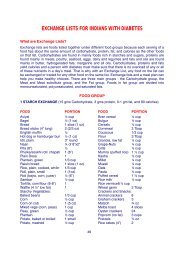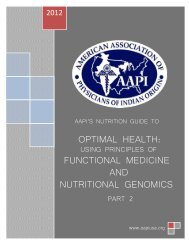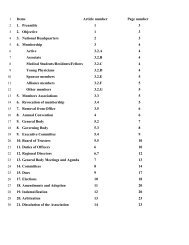functional medicine and nutritional genomics - American Association ...
functional medicine and nutritional genomics - American Association ...
functional medicine and nutritional genomics - American Association ...
Create successful ePaper yourself
Turn your PDF publications into a flip-book with our unique Google optimized e-Paper software.
AAPI’S NUTRITION GUIDE TO OPTIMAL HEALTH: USING PRINCIPLES OF FUNCTIONAL MEDICINE AND NUTRITIONAL GENOMICS<br />
10<br />
A Nutrition Genomics<br />
Approach for the<br />
Management Of<br />
Crohn's Disease: An<br />
Inflammatory Bowel<br />
Disease<br />
Sheila Dean, DSc, RD,<br />
LD, CCN, CDE<br />
Abstract<br />
The emerging field of <strong>nutritional</strong> <strong>genomics</strong>, defined as<br />
the interface between genes <strong>and</strong> nutrition, is credited<br />
with debunking the concept that ‚one size fits all‛ as<br />
it relates to <strong>nutritional</strong> management of chronic disease,<br />
including inflammatory bowel disease (IBD). Crohn’s<br />
disease (CD), a subcategory of IBD, contributes to<br />
significant morbidity, particularly in industrialized nations.<br />
It is characterized by chronic inflammation <strong>and</strong><br />
ulceration that can occur in any portion of the<br />
intestinal tract. A number of factors contribute to its<br />
etiopathogenesis, including genetic, microbial,<br />
inflammatory, immune <strong>and</strong> permeability abnormalities.<br />
Several susceptibility genes have been associated with<br />
IBD, however this review is focused specifically on<br />
three IBD-associated genes that appear to identify<br />
major susceptibility loci for CD: 1) CARD15/NOD2<br />
2) DLG5 3) SLC22A4/A5 (OCTN1/OCTN2).<br />
Variations of these genes <strong>and</strong> their potential impact on<br />
IBD pathogenesis are discussed. Nutritional<br />
85<br />
2012<br />
management, including the use of various <strong>functional</strong><br />
clinical tests, <strong>nutritional</strong> influences in IBD <strong>and</strong> a<br />
<strong>functional</strong> <strong>medicine</strong> systems biology approach referred<br />
to as the 4R― Gastrointestinal (GI) Restoration<br />
Program is described. The 4R― approach, ‚Remove,<br />
Replace, Reinoculate, Regenerate‛ provides a<br />
framework in which to focus clinical assessment <strong>and</strong><br />
intervention. Future strategies including a discussion of<br />
the evolving role of the registered dietitian are offered.<br />
Introduction to Nutritional Genomics<br />
Nutritional <strong>genomics</strong> is an emerging field that is now<br />
defined as the interface between genes <strong>and</strong> nutrition. It<br />
addresses the concept of one’s biochemical <strong>and</strong><br />
genetic uniqueness <strong>and</strong> how that interacts with<br />
environmental factors such as diet. This interaction then<br />
gives rise to outward, physical traits known as the<br />
phenotype. While <strong>nutritional</strong> <strong>genomics</strong> continues to<br />
develop, the groundwork was established over 50<br />
years ago by pioneers, such as Linus Pauling, Ph.D.

















